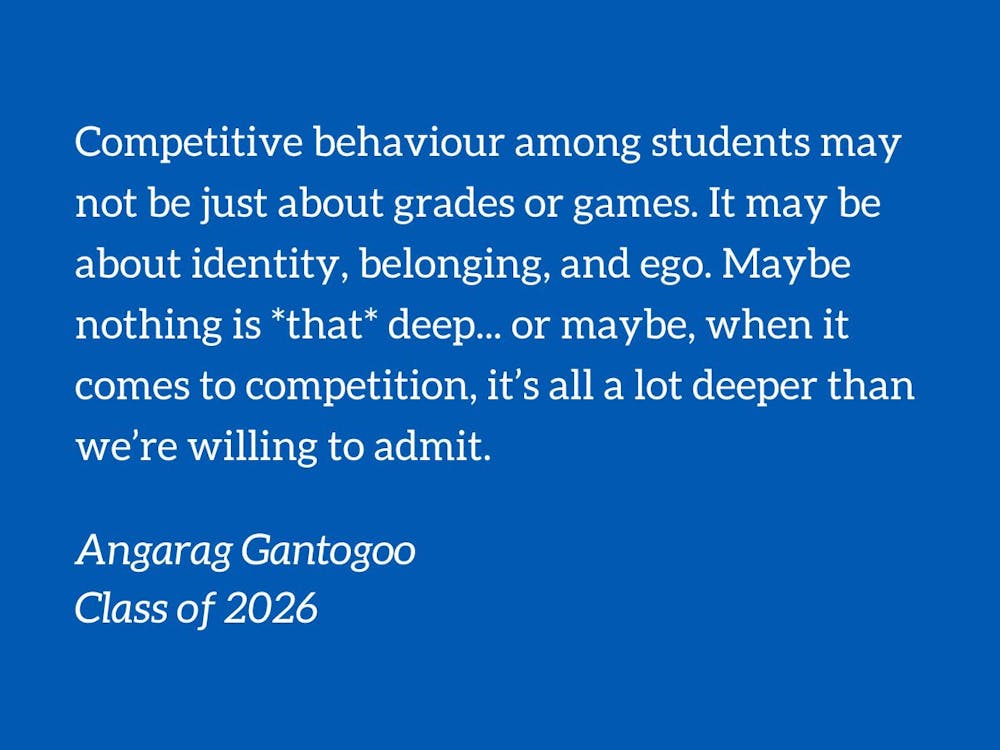There’s nothing quite like the buzz of competition among students. Whether it's vying for top grades, landing a coveted internship, or just showcasing who has the better campus spirit, the need to one-up each other is practically baked into academic culture. But is it really that serious? Or are we just overthinking it?
I remember this one time my friend accidentally wore a Duke shirt to UNC. What happened next wasn’t surprising. People were rude. Some gave her cold stares, others made snarky comments, and a few even screamed ‘You don’t belong here!’. It was like she’d committed an unforgivable crime. Sure, the rivalry between the two schools is legendary, but was it really that deep? Apparently, it was.
This led to the question: Why do we care so much? Why does wearing the “wrong” shirt spark such intense reactions? Why do we feel a twinge of satisfaction when we ace a test that others found challenging, or when we snag an opportunity that our peers didn’t? It’s all about competition, and in some ways, maybe it’s just part of human nature.
For students, competition is often tied to identity and self-worth. It’s not just about getting an “A” or making it to the Dean’s List; it’s about proving something — to our parents, our professors and, most importantly, ourselves. In a world where academic achievements are quantified and ranked, it’s easy to equate our accomplishments with our value. A rivalry between two schools, like UNC and Duke, may be playful on the surface, but it goes deeper. It’s a way to feel part of something bigger than ourselves, to bask in the glow of a shared victory, and to show the world (or at least the student section) that we’re on the “winning” team.
In some ways, competitive behaviour can redeem our ego. It can be validating to win or to prove that we belong among the best. The thrill of competition isn’t just about beating others; it's also about feeling seen, heard and validated. In an academic setting, the stakes feel high because they are — grades, future opportunities and social recognition are all on the line. When we succeed, it’s as if the universe has given us a stamp of approval. We belong. We’re good enough. And we get to walk around campus wearing our metaphorical “winning team” jersey.
But here’s the kicker — what happens when we lose? When my friend was ridiculed for her Duke shirt, she laughed it off. But not everyone can brush off the sting of not measuring up. Losing — whether it's on a test, in a game, or just feeling left out of a prestigious group — can feel like a blow to the ego. The same competitive drive that lifts us up can also drag us down, making us feel smaller or less capable. It’s a double-edged sword, and maybe that’s why we get so worked up about seemingly trivial things, like which school has the better team or who got the highest score in class.
So competitive behaviour among students may not be just about grades or games. It may be about identity, belonging, and ego. Maybe nothing is that deep... or maybe, when it comes to competition, it’s all a lot deeper than we’re willing to admit.
Angarag Gantogoo is a Trinity junior. Her column, "Peopleology," typically runs on alternate Saturdays.
Get The Chronicle straight to your inbox
Sign up for our weekly newsletter. Cancel at any time.

